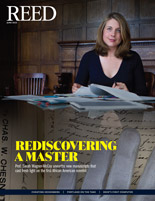
IRIS login | Reed College home Volume 94, No. 2: June 2015
Prime Exponent
How apt is Prof. Joe Roberts’ description of his Math 111 as a cultural course, introducing students to the language and conceptions of mathematics (Reed, September 2014). When I began Reed in 1956, Math 11 both overwhelmed and inspired. Beginning with the logical calculus of Whitehead and Russell, proceeding to the axioms on succession by Peano, we created the number system as guided by H. A. Thurston in his terse work used as text on the very year of its publication. The aesthetic and logical coherence of that course was stunning. Math 11 remained my most favorite of all my courses through four years at Reed. But, I must add, I had as well the guidance of Prof. John Leadley [1956–93] leading our study group, who added that systematic sanity of an algebraist to complement the maverick genius of a number theorist such as Roberts, who gloried in the ingenuity of a proof. We must add the name of Prof. Lloyd Williams ’35 [mathematics 1947–81] to the duo, Leadley and Roberts. Roberts may have initiated that course, as pointed out in “Prime Exponent,” but that year Williams was the lecturer, to whom we listened three times a week before we attended our separate discussion groups, where I joined Prof. Leadley. In my junior year I attended Roberts’ Modern Algebra course, but after months of satisfactory performance, I decided I needed to drop it. To this day, I wished I had forced my way in Leadley’s Modern Algebra class, but I was arbitrarily assigned to Roberts and was not allowed to switch sessions. My comments about the difference between an algebraist and a number theorist are heartfelt. Blessed be both their endeavors. So captivated by such systems of thought, I became a philosophy–anthropology major at Reed, then, as an anthropologist studying Rajasthan, India, was inspired to analyze a natural number system on the base four in an article, “Gold Medallions: The Arithmetic Computations of an Illiterate” (Anthropology & Education Quarterly, Volume 15, 1984). The revered work of Thurston guided the task.

LATEST COMMENTS
steve-jobs-1976 I knew Steve Jobs when he was on the second floor of Quincy. (Fall...
Utnapishtim - 2 weeks ago
Prof. Mason Drukman [political science 1964–70] This is gold, pure gold. God bless, Prof. Drukman.
puredog - 1 month ago
virginia-davis-1965 Such a good friend & compatriot in the day of Satyricon...
czarchasm - 4 months ago
John Peara Baba 1990 John died of a broken heart from losing his mom and then his...
kodachrome - 7 months ago
Carol Sawyer 1962 Who wrote this obit? I'm writing something about Carol Sawyer...
MsLaurie Pepper - 8 months ago
William W. Wissman MAT 1969 ...and THREE sisters. Sabra, the oldest, Mary, the middle, and...
riclf - 10 months ago